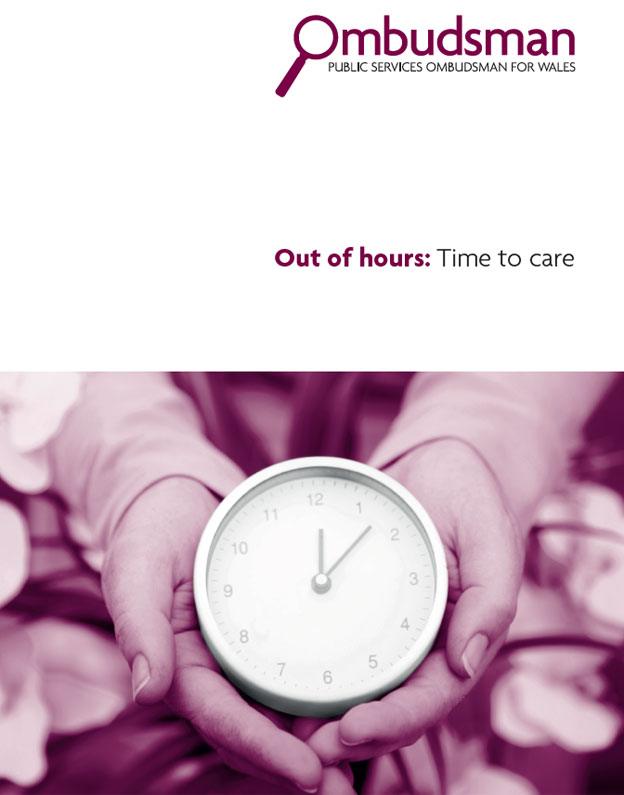Out-of-hours NHS: Cases for concern in Wales
- Published

There needs to be a systemic review of out-of-hours hospital care in Wales, says the public services ombudsman.
A snapshot of 12 cases investigated by the watchdog over the past five years shows "inadequate standards of care" given to patients, including at weekends.
Nine of the patients died, although in most cases the out-of-hours care was not necessarily a factor. The hospitals and names of patients were not identified by the ombudsman.
Here are summaries of five of the cases:
1 Elderly motor neurone disease patient - feeding tube not fitted for 40 hours, 2011
A patient with a history of motor neurone disease and dementia admitted to hospital after a fall. Transferred to a medical ward early on Friday and seen by a consultant. Due to difficulty swallowing, he was to fed by a tube. But there was no attempt to insert a tube until the Sunday - 40 hours later. His condition deteriorated and he died two days later.
The ombudsman found it "entirely unacceptable" that an elderly, nutritionally deficient patient had to wait so long before an attempt was made to insert a tube to feed him.

2 Patient with abdominal pains, who needed an urgent operation, 2010
Admitted to hospital with vomiting and abdominal pain early on a Friday and a consultant physician suspected gastroenteritis or peritonitis. X-ray carried out which showed signs of colitis. A registrar reviewed the case at 17:00 and advised continuation of treatment plan. Unclear if the consultant still in the hospital. Abdominal pain worsens and registrar reviews the patient at 01:00 on Saturday. No medical or surgical review on Saturday. Consultant surgeon diagnoses severe infection and shock and requests scan on Sunday morning which finds fulminant colitis. Patient dies before he can be transferred to intensive trauma unit.
Ombudsman found if consultant surgeon had seen him on the Friday, emergency surgery would have been carried out and his death could have been prevented. No effective referral between consultants before or during the weekend and poor communication.


3 Patient with kidney problems - lack of weekend reviews, 2012.
In hospital with spinal condition discitis. Blood tests indicated impaired kidney function but not checked for two days and then not repeated for a further six days, when doctor said he was then aware of decline in kidney. The patient also once had to use a black bag to vomit into and he slept under his sister's coat to keep warm because of lack of blankets. Transferred to the high dependency unit and then to another hospital, where he died a couple of weeks later.
Ombudsman found lack of weekend reviews caused delays in treatment. Several missed opportunities to diagnose kidney failure and repeated failures to maintain his hydration levels. A consultant commented on a shortage of doctors at the hospital during the weekends and "as a result patients do tend to deteriorate over the weekend period".

4 Patient with a stroke - five days to see a specialist, 2012
A 77-year-old man admitted on a Friday with a suspected stroke to his left side. A scan in the afternoon followed by ward admission at 21:50. Not transferred to a specialist stroke ward, or acute stroke unit at neighbouring hospital due to lack of beds initially but missed opportunities over the weekend when beds became available. His family made repeated requests for him to see a specialist but told none available. Two trainee doctors assessed him over weekend until a consultant saw him on the Monday. Specialist stroke physician eventually reviewed his case on Tuesday afternoon and transferred him.
Ombudsman found junior doctors were unaware of the availability of, or unwilling to contact, on-call consultants.

5 Patient with kidney failure - no consultant review at weekend, 2012
Duty consultant physician confirms gastroenteritis, dehydration and impaired kidney function diagnosis. Intravenous fluids prescribed over 24 hours but plan not completed. Condition deteriorates rapidly on Saturday and on Sunday he suffers respiratory arrests - and dies after the second.
The ombudsman found staff failed to adequately rehydrate the patient or respond appropriately to his acute kidney failure, while doctors failed to monitor him adequately. His intravenous fluids were stopped overnight without explanation. Not sure if death could have been avoided but further consultant physician review after admission on the Thursday night was "unacceptable".
- Published8 March 2016
